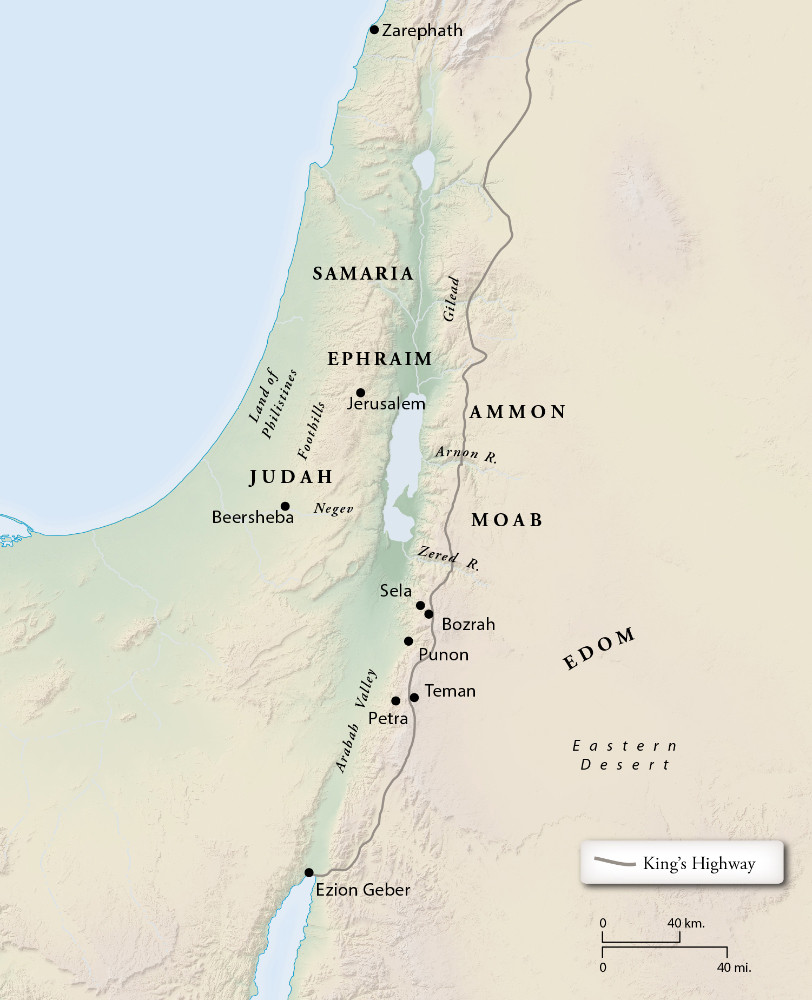
Though the shortest OT book (only 292 Hebrew words), Obadiah’s prophecy is a powerful, two-pronged message from God: those oppressing God’s people will suffer the consequences, and his people will triumph. All is in the hand of the Lord.
Author
The narrator is identified only by name, Obadiah (which means “the Lord’s servant”), with no information concerning time or parentage, though his parents must have been pious followers of Israel’s God to give Obadiah his name. At least 11 other OT characters have this name.
Date
The book does not mention any specific date indicators such as kings’ reigns, so one must use detective work, analyzing the events mentioned. Verses 10–14 most likely refer to either the second deportation in 597 BC (2 Kgs 24:8–13) or the fall of Jerusalem and the exile of Judah’s leaders to Babylon in 586 BC (2 Kgs 25:1–9). Therefore, the prophecy is certainly later than the earlier date, probably later than the later date, and most likely from the middle decade of the sixth century BC.
Occasion and Purpose
Edom, Israel’s eastern neighbor (Gen 36:6–8), had been mistreating their relatives, the people of Judah, for which God calls them to account. God also takes this opportunity to speak against any nation that acts against his people. Judah, humiliated by their enemy’s actions, can now take hope since God will restore what they had lost.
Genre and Structure
The poetic prophecies, which make up the majority of the book, are introduced and interrupted by prose elements in which the author identifies the broad literary genre of the book as a vision (v. 1) and its source being the Lord (vv. 4, 8, 18). The poetry includes a battle call, which begins the prophecy (v. 1), judgment speeches against Edom (vv. 2–14) and every nation (vv. 15–18), and ends with a salvation promise to Israel (vv. 19–21).
Themes and Theology
The lordship of God encompasses the book (vv. 1, 21), as well as his sovereignty over all humanity. God shows his justice by calling people, even pagan Edom and the nations, to account for their hurtful actions against his chosen nation. The Edomites are specifically singled out due to their kinship relationship with Israel, which should demand support rather than opposition. While Israel’s punishment through defeat and exile is justified since they broke their covenant with God (Deut 29:28; 1 Kgs 14:15–16), God’s grace and faithfulness to his own covenant obligations toward Israel (Deut 30) lead him to restore them (vv. 17–21). God does not make a blanket, permanent judgment of punishment on the nations, but makes judgment or blessing dependent on their response to God and his people (v. 15). The time for this judgment is the day of the Lord. This day is a final, eschatological event (2 Pet 3:12–13) when the faithful are blessed (Joel 2:28–32) but sinners are punished (Amos 5:18–20). Prior to this culminating event there are also times of judgment throughout Israel’s history—anticipatory days of the Lord (Joel 1–2).
Outline
I. Heading (1)
A. Title (1a)
B. The Lord Against Edom (1b)
II. Messages Against Edom (2–14)
A. Pride’s Downfall (2–4)
B. Hurtful Enemies and Friends (5–7)
C. In That Day (8–10)
D. Why You Suffer, Edom (11–14)
III. The Nations and Israel (15–21)
A. A Reversal (15–18)
B. Israel Will Return (19–21)
![]()
![]()
![]()

